|
|
|
 |
Senegambian Musicians |  |
|
This are some of the Senegambian musician's photos
|
||||||||||
|
|
||||||||||
| Alioune Mbaye Nder Summer 1999: the song "Pansement" by Alioune Mbaye Nder and the Setsima Group has hit the airwaves, and can be heard non-stop on all FM stations and in discotheques throughout Senegal. "Pansement" (i.e. "bandage") is the story of a husband who desparately tries to get his angry wife to pardon him and thus end the conjugal "strike" ... These are the vignettes of daily life that NDER sings about in the vibrant mbalax style, which over the past five years have won him enormous popularity. A dancer and percussionist in his youth, Nder began his singing career in 1991 with the group Lemzo Diamano, for which he became lead vocal two years later. In 1995 Nder left Lemzo Diamano to form his own band, the Setsima Group. Released in December, his first solo cassette (entitled "Aduna") immediately thrust the new group under the spotlight. Since "Aduna." each new cassette has reinforced the popularity of this modern griot: "Leneen" in 1997, "Aladji" in 1998, "Pansement" in 1999, "Super Thiof" in 2000 have all hit the top of the national charts. His cassette, "Live Anniversaire" in two volumes, released in March 2001, has already been a major success. |
 |
|||||||||
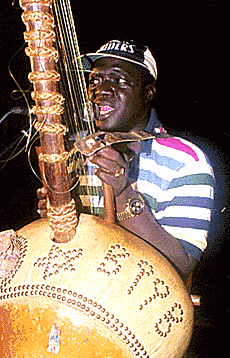 |
Jaliba Kuyateh Jaliba Kuyateh is a recognized Gambian artist in the area of performing arts who contributed greatly to the promotion of Gambian culture and the development of African and Gambian music in particular. He composed many songs conveying messages to the people on social issues and rendered services free of charge to build schools, religious centers and health centers. As a child during the ages of five to seven years, Jaliba was trained on the Kora - a twenty-one stringed musical instrument, mainly found in countries along the west coast of Africa. This happened through his father who was also a player of the Kora. At this time, if he did anything wrong, his father was using the kora as a form of punishment by giving him a tune to play on the Kora before he was allowed to go out and play with friends. Through this, he was able to acquire the basic skills on the instrument since the time he was very young. |
|||||||||
| Omar Pene Existing for more than 20 years now, Super Diamono has always addressed issues concerning the youth in their lyrics. This accounts for the hugh popularity among young Senegalese. Singer and composer Omar Pene created the band with Ismael Lô and they started to play traditional music. After some years, they introduced electric guitars and joined the new mbalax style en vogue in Dakar since the end of the 1970s. Yet, Super Diamono have a distinct style easily recognizable. In the course of years, several musicians left the band for solo careers or to create off-shoots such as Lemzo Diamono, but they continue to show both talent and craftmanshipExisting for more than 20 years now, Super Diamono has always addressed issues concerning the youth in their lyrics. This accounts for the hugh popularity among young Senegalese. Singer and composer Omar Pene created the band with Ismael Lô and they started to play traditional music. After some years, they introduced electric guitars and joined the new mbalax style en vogue in Dakar since the end of the 1970s. Yet, Super Diamono have a distinct style easily recognizable. In the course of years, several musicians left the band for solo careers or to create off-shoots such as Lemzo Diamono, but they continue to show both talent and craftmanship |
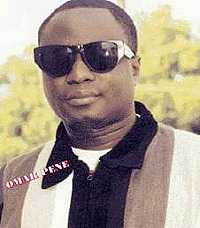 |
|||||||||
 |
Viviane Ndour Viviane was born at Mbour, small known seaside resort for her hotels and her beaches of fine sand on the small Atlantic coast of Senegal. Its love of the music l?amena very early to organize small shows with a band d?amis in the hotels of the seaside resort. But it really "exploded" lorsqu?elle joined the most popular group of Senegal, the "Super Star" of Youssou Ndour as chorus-singer in 1993. Viviane continued to work her voice and with l?adapter with the music of Youssou Ndour. After did 4 years of hard labour, it leave its first album "Between Us" with like piece fetish "Sama Nene"? become a hit before even the exit of l?album. The success of this production goes booster rocket its career and its second "Natural" album will be quite as popular as the first. One year later, it positions like one of the largest musicians in sight in Senegal. It leaves a third album, "the Show" with its group coldly created, "Jolof Band" and makes its first World Tour which l?amene in Africa, Europe and America. Its last album "Tere Nelaw" currently makes a tobacco in the night clubs and the radios FM of Dakar in spite of a lawsuit for plagiarism on one of the pieces. Discography "BETWEEN US" 1999 "NATURE" The 2000 "SHOW" 2001 |
|||||||||
| Coumba Gawlo Kambis Culture - Biographie Senegal is considered landlaeufig as the Mekka of the music and music industry in Africa. No other country achieves such a large attention and Reputation by its musical exports. Often excellent musician such as Youssou N`dour, Baaba Maal, Coumba Gawlo, Cheickh Lo uva. embody the westAfrican country on the musical world Atlas. Some outstanding musicians found their way years ago also to Austria. Approximately around those all-side well-known Djembe group of Tam Tam d`Afrique is formed in recent time a set of innovative young musicians, who try new sounds out in interaction with gleichgesinnten Austrian interpreters. Openness, Spontanitaet and play joy that volume infisziert inevitably. Before the background more floating Mbalax beats develops a close fabric from RAP, radio, jazz, which lets true Afro Feeling arise. Project the project was prepared by Pathe Beye and based together with its brothers Mame Birane M`boup and Madjeng case. The three Trommler from one the most outstanding Griotfamilien (musician caste) Senegal supply the musical basis of this formation, from Austrian side besides the Saxophonistin Edith Lettner, bassist Dieter Rhemann and guitarist Josh Benda music the music consists of an ingenious mixture of fast Trommelrythmen of the Mbalax tradition, filtered by Afro Beat influences, with an open window into all directions: Radio, jazz, Salsa and Latin. |
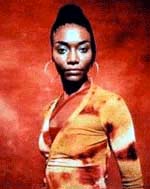 |
|||||||||
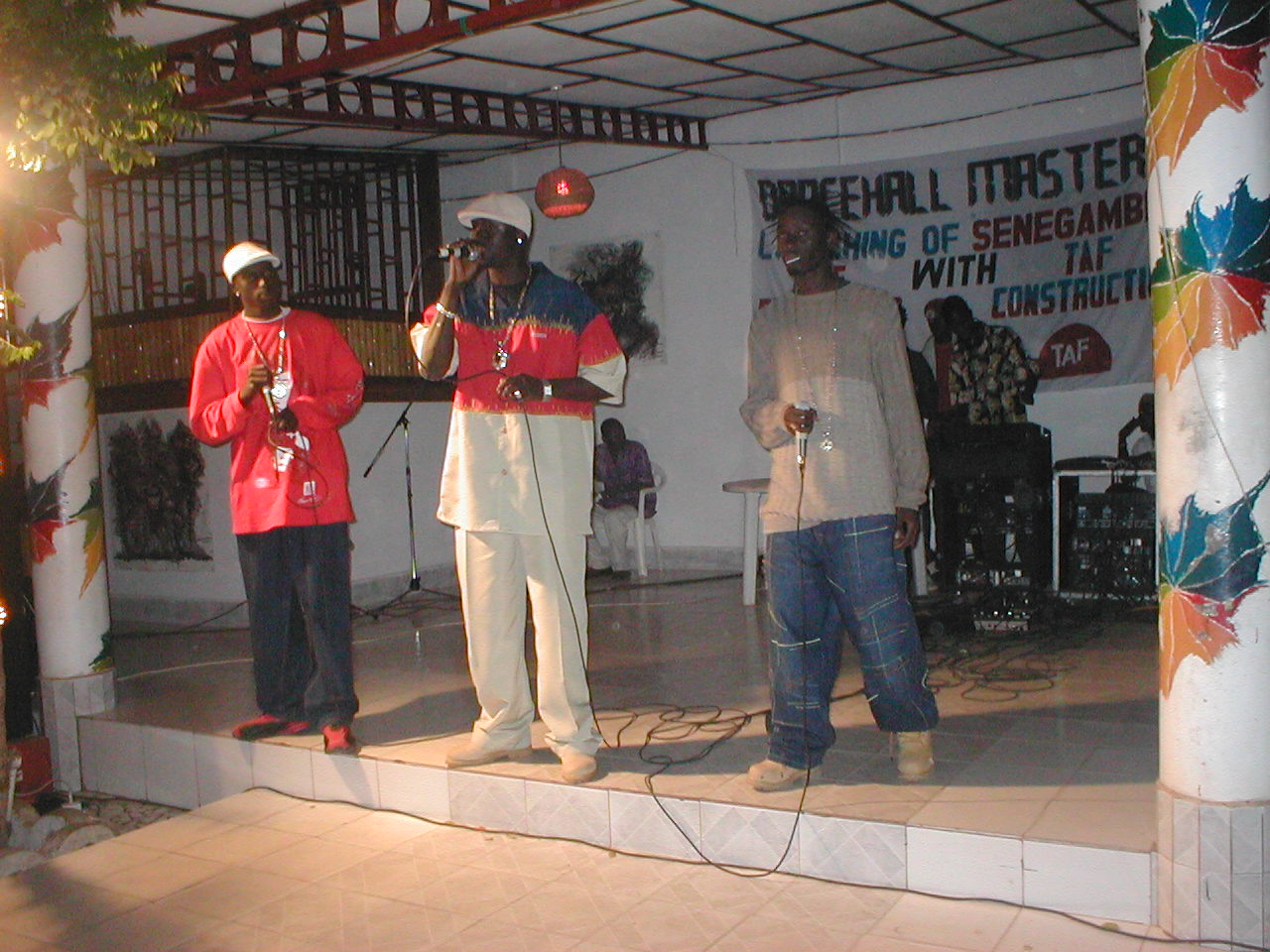 |
Hamaleh G Crew. HAMALEH G is a musical group in the Gambia. Hamaleh G is a local name meaning ENLIGHTMENT. The group was found in 1999 and its Motto is ''HIT 'D' SEA'' The group is currently working on its new album The group is composed of three Vocalist, namely: FREADY MAN, FRICKY L AND CLIFF LION. Since the formation of this group, they have been doing wonders in the gambian music scene.............more |
|||||||||
| Thione Secka THIONE BALLAGO SECK delivers a hard-edged take on Dakar's classic mbalax sound. The style is based in the driving polyrhythms of Wolof sabar drumming. Seck began his career as a griot, and he has a powerful, majestic voice worthy of a traditional praise singer. In the early '70s, he sang briefly in Orchestra Baobab, Senegal's classic salsa band, currently enjoying a glorious revival on the international scene after fifteen years of dormancy. But Seck has long since parted ways with the kings of Senegalese salsa. Beginning in 1974, he has headed his own band, Raam Daan, which means "to achieve your goal." The grandeur of griot song and the sensual romanticism of salsa remain elements in Seck's sound, but his goal was neither of these, and for nearly 30 years now, he's been making music entirely on his own terms. When Afropop first met Seck in Dakar in 1987, he told us he likes to play mbalax "pur et dur"--pure and powerful. The most striking thing about his sound is the contrast between his bands' cracking, aggressive rhythms, and his own serene, soaring voice--the still center of a musical hurricane. Seck and Raam Daan's yin-and-yang effect was on glorious display at Irving Plaza last Friday. Raam Daan uses three keyboards and just one guitar. Normally, this would not be a winning Afropop formula, but the core of the band's sound is really its rollicking percussionists whose taut rhythms power the music. Two of the keyboards play interlocking lines and the third stands in for a brass section, but while this kind of electronics barrage might easily spoil the mix in another roots music band, in Raam Daan, the sound works. (courtesy: afropop world)
|
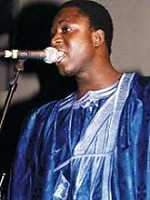 |
|||||||||
 |
Fatou Gewel Diouf Mbalax. Fatou Gewel is a wolof griot. She was born as Fatou Binetou Diouf, June 1964 in Dakar. Many of her songs are Mouride praise songs which makes her very popular. She deliberately loads her music with extra percussion whose collective effect is riveting. The Groupe Sope Noreyni consists of Djiby Guisé (xalam); Tapha Faye (keyboards); Abdoulaye Dieng (bass); Mbaye Gueye Ndiaye (thiol djembé); Talibé Mbaye (talmbatt); Serigne Modou Diagne (tougouné). Her albums include Santa Ti Cheikh Ibra Fall (Cass. KSF Diagne 1994), Fiirnde Santa Bamba (Cass. KSF Diagne 1995), Santeti Mame Diarra Bousso (Cass. KSF Diagne 1998), Fatou (CD Stern 1998) Compliation of her 3 cassettes |
|||||||||
| DanceHall Masters During the 1999 first Gambian Rap Awards, Dance Hall Masters were voted as the Best New Group. The trio who came together in November 1998 with the motive of enlightening young as well as old on issues worth knowing about are Brother Coms Daddy Sam and Mister P. The groups vocalists Brother Coms (Lamin Fatty) and Daddy Sam (Mam Balla Joof) were recognised solo singers before teaming up, at the request and encouragement of Pa Jallow of Studio Galan. They were later joined by dancer Mister P. Their latest album "Brother Man", released in October 1999 is appealing to the youths not to despair; that life can be hard or easy; that in life all doors could be closed to develop one's abilities to the fullest. Life could as well be of ups and downs, but with persistent struggle and determination, one will one day reap the fruits of one's labour. When they started their singing career, their families were not supportive. Like some, they felt music is associated to drugs. "But we are determined not to be seen in that light." They assured. Their parent's support is not the only problem they are facing. One of their most pressing problem is the problems of sponsorhip. They don't have anyone to assis them financially. |
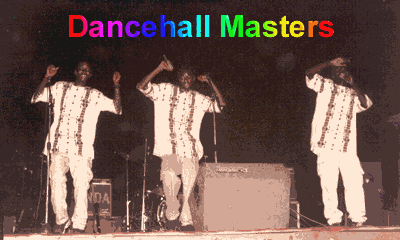 |
|||||||||
 |
Positive Black Soul By imposing African rap music on the international scene, the two members of PBS gave roots back to a genre directly issued from Black American music. Today, hundreds of groups are following in their footsteps but few have managed to achieve the fame of the Senegalese duo.
|
|||||||||
| Ifang bondi Band Since their formation in 1973 the Gambian pop group Ifang Bondi have added an entirely new dimension to the music of Western Africa Once part of the great Manding empire, The Gambia is the historical home of an impressive number of cultures: Mandingo, Wolof, Fula, Jola, Serer, and many others, all cherishing their own musical traditions. Digging DEEP into this amzingly rich musical heritage Ifang Bondi have come up with a unique style: the Afro Manding Sound. Highly appreciated by real music lovers, happily adopted by many other West African groups. |
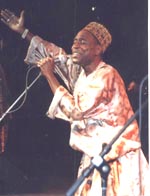 |
|||||||||
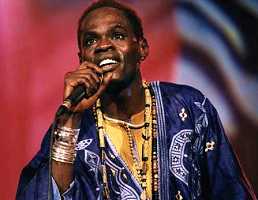 |
Baaba Maal The richness of Senegal music cannot be denied. Some artists, like Baaba Maal, manage to reproduce the essential traditions while blending them with more modern sounds. His Toucouleur blood also adds a particular note which rings in his songs. With Youssou N'Dour and Ismaël Lô, Baaba Maal forms a trio which has sent Senegal musical culture rocketing to the top of the international charts.
|
|||||||||
| Sotokoto Band The vision of Gambian-born and United States-based world music deejay and festival promoter Oko Drammeh, the Soto Koto Band combined the rhythms of Africa, the musical sensibility of modern European dance music, and the intensity of big band jazz. www.themusicmagazine.com described a performance by the Soto Koto Band as "a tinkling instrument plays the lead on a track of African drums and leads on to African voices and trumpets in the big band jazz style," while www.taobooks.com claimed that the band's "spectacular percussion and exotic rhythms generate an irresistible urge to dance." The Soto Koto Band joined with West African vocalist Abdel Kabirr to record an album of songs and instrumentals, Gumbay Dance, in 1991... |
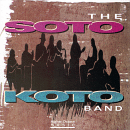 |
|||||||||